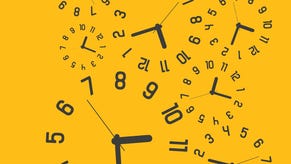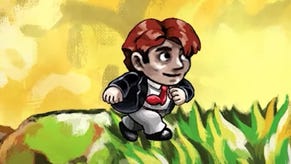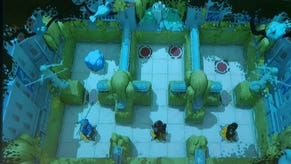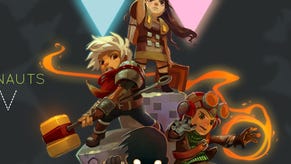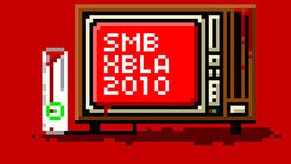Braid
Everything changes.
In World 5, each rewind creates a shadow universe in which your ghost carries out the same actions as before, essentially creating two versions of yourself separated by time. If your brain just snapped you won't be alone. By the time you reach the end of the game, in World 6 and finally World 1 (yes, even the level sequence is off-kilter) it's as if you've just experienced the most charming and entertaining quantum mechanics lesson of all time. Only Portal comes close to the mentally liberating effect of Braid's construction, but even that feels like a half-measure in comparison. Time is fluid. Past, present and future are not destinations in a straight line but resources to be used, if only you can free your brain from its archaic A-to-B trajectory. Sorry Kutaragi-san, but this is 4D gaming and it could only have come from the world of the homebrew developer.
You see, Braid's creator, Jonathan Blow, has more in mind than just shaking up tired old gameplay conventions. He wants to create games that make you think and feel. Braid doesn't have a story, at least not in the traditional linear narrative sense, but there's a lead character, Tim, and his mission is to find a princess. She's not a literal princess though, but a metaphor - the romantic cliché of that perfect soul mate as filtered through popular videogame motifs. The classic Mario line "our princess is in another castle", knowingly reused here, is more than just an ironic wink to gaming history. In the context of Braid's melancholy mood, it becomes a bona fide commentary on the human condition. Our princess is always in another castle.
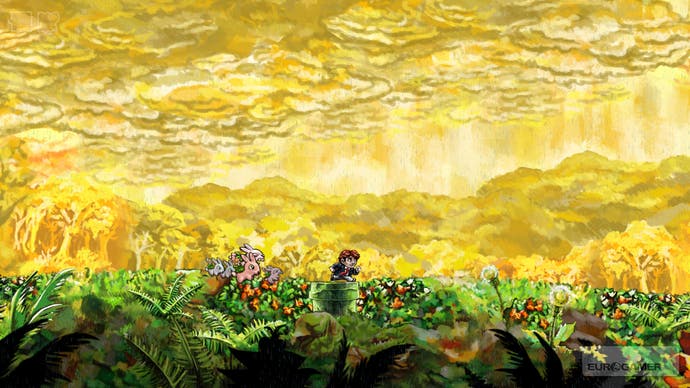
Each world is preceded by a series of books, which produce text passages as you walk past. They detail fragments of Tim's past - people he left, people who left him, as he searches for this princess. "Her benevolence has circumscribed you, and your life's achievements will not reach beyond the map she has drawn" is a typical example. You can sprint past these sections, should you wish, but to do so means missing the point quite spectacularly. Surrender to the game's reflective intentions and it can be quite profound. I have no problem admitting that I found myself thinking about people and places that I'd not considered for years. Relationships that ended too soon. Some that went on far too long. Memories that no longer seem reliable. Others that are still painfully vivid. It's a platform game. It's an emotional journey. Whatever you invest in Braid, it repays many times over.
Given its lofty ambitions, it almost seems mundane to set aside a paragraph to discuss such shallow matters as graphics and sound, but both these elements are expertly woven into Braid's canvas. The hand-painted graphics are truly stunning. They're lovely to look at, but also serve a deeper purpose. The graphical palettes for each world subtly evoke and develop the themes established by the text. Musically too, there's a creative coherence. Gentle folk music soundtracks the optimistic early stages. Music box nursery rhymes play off against levels that explore the friction between childhood and adult freedoms. Even the jigsaw puzzles that you must collect and solve depict enigmatic scenes laden with abstract meaning.
What does it all mean? Whatever you want it to, I suspect. There's not one single correct answer to be found, but a series of reflections. Playing with time isn't just a gameplay element, it's the core of the whole game. What if you could take back mistakes? What if your life could carry on in two different directions at once? What if the world really revolved around you - would that help or hinder your progress?
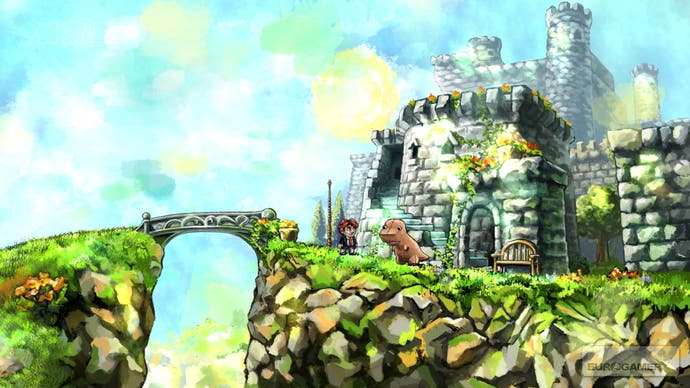
You could argue that by using the doomed romanticism of an introspective male as its core that the game is treading clichéd creative soil but in a medium as emotionally stunted as videogames it still represents an enormous leap towards realising the potential of the form. Great novelists, filmmakers and painters have cultivated entire careers and acclaimed bodies of work from this sort of thing, so it seems churlish to criticise a games designer for attempting the same.
I almost never give out full marks, generally reserving that honour for retro games that have proven their worth many times over, but Braid has me in its spell. Judged purely as a game, it's cunning, ingenious and endlessly surprising. The puzzles are varied, the level design is revelatory and the whole thing clicks together like clockwork. For those only interested in gameplay, it's simply an excellent puzzler-cum-platformer. But there's so much more here, a desire to create a game experience that is more than mere technical craft. That it succeeds in creating an abstract emotional experience, one where each player can find their own level of meaning and personal context, all within the confines of the 2D platformer, is perhaps the most astonishing achievement of all.
Braid is beautiful, entertaining and inspiring. It stretches both intellect and emotion, and these elements dovetail beautifully rather than chaffing against each other. Still wondering if games can be art? Here's your answer.

